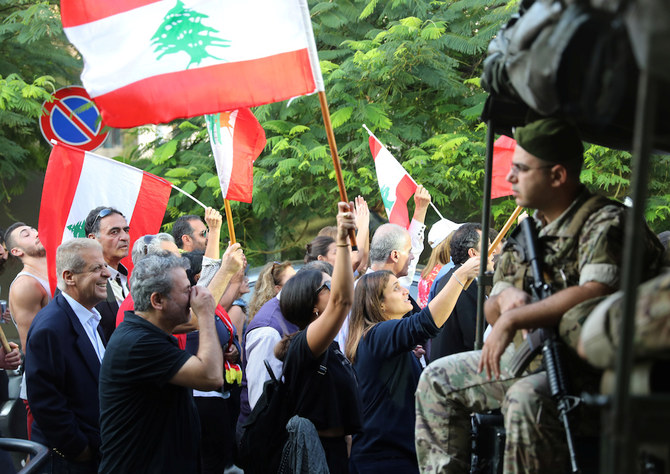BEIRUT: Lebanon’s president Thursday said the country’s next cabinet should include ministers picked on skills, not political affiliation, seemingly endorsing a demand by a two-week-old protest movement for a technocratic government.
Michel Aoun’s speech came as Lebanese protesters tried to block reopened roads and prevent their unprecedented non-sectarian push for radical reform from petering out.
It followed the resignation of Prime Minister Saad Hariri’s government on Tuesday which had been met with cheers from crowds seeking the removal of a political class seen as corrupt, incompetent and sectarian.
“Ministers should be selected based on their qualifications and experience, not their political loyalties,” Aoun said in a televised speech on the third anniversary of his presidency, pledging also to combat corruption and enact serious reforms.
But his speech was met with disdain by demonstrators in central Beirut who, in response to his words, chanted the popular refrain of the 2011 Arab uprisings: ‘The people demand the fall of the regime.’
Nihmat Badreddine, an activist, said the president’s promises were “good in theory.”

Lebanese men watch a televised speech by Lebanon's president Michel Aoun. (AFP)
“But there is no mechanism for implementation... and there is no deadline” she said, expressing fears of a stalled process.
Sparked on Oct.17 by a proposed tax on free calls made through messaging apps such as WhatsApp, the protests have morphed into a cross-sectarian street mobilization against an entire political class that has remained largely unchanged since the end of the country’s 1975-1990 civil war.
Some schools have reopened this week and banks were due to reopen on Friday, as the protests piled more economic pressure on a country that has been sliding toward debt default in recent months.
Key members of the outgoing government, including the Shiite Hezbollah movement and the Christian president’s Free Patriotic Movement have warned repeatedly against the chaos a government resignation could cause.
“Lebanon is at a dangerous cross roads, especially with regards to the economy,” Aoun said on Thursday.
“So there is a dire need for a harmonious government that can be efficient without getting tangled in political disputes.”
Aoun has asked Hariri’s government to stay on in a caretaker capacity until a new one can be formed, but Lebanon has entered a phase of acute political uncertainty, even by its own dysfunctional standards.
With a power-sharing system organized along communal and sectarian lines, the allocation of ministerial posts can typically take months, a delay Lebanon’s donors say the debt-saddled country can ill afford.
French Foreign Minister Jean-Yves Le Drian said it was “essential for Lebanon’s future that a new government be formed rapidly to carry out the reforms that the country needs.”
The new government would need to “address the legitimate aspirations expressed by Lebanese and take the decisions indispensable to the country’s economic recovery,” he said.
Consultations for the formation of a new government have not yet started, such is the rift between Hariri and his coalition rivals, according to a political source involved in discussions.
The source said that consultations are scheduled to begin on Monday.
Aoun was thought to be insisting on keeping his son-in-law Gebran Bassil, who is Lebanon’s foreign minister and one of the most reviled figures among protesters, in government.
But “a technocratic government is a possibility,” political analyst Amal Saad-Ghorayeb said.
“It would have to ensure a short-term stabilization of the economy, which has spiralled out of control these past weeks, while ensuring economic reforms pass quickly, otherwise mass protests will erupt once again,” she added.
The fall of the government under pressure from the street had led to an easing of the lockdown that has crippled the country of six million inhabitants.
While some life returned to Beirut and other cities this week, die-hard protesters were reluctant to lose one of the few forms of leverage they have to press demands that go far beyond the cabinet’s resignation.
“Giving up is out of the question,” said Tarek Badoun, 38, one of a group of demonstrators blocking the main flyover in central Beirut.
The mass mobilization, which has seen hundreds of thousands protest nationwide, has so far been largely bloodless, despite sporadic scuffles with counter-demonstrators from the established political parties.
“We have decided to stay on the streets because we don’t feel like the government is serious about speeding up the formation of a cabinet,” said Mohammad, 39, who was demonstrating near the northern city of Tripoli.
Earlier, Hezbollah’s parliamentary bloc said Hariri's resignation would waste time available to enact reforms which are widely seen as necessary to steer Lebanon out of an economic crisis.
In a televised statement read by one of its MPs, the bloc said parliamentary consultations should take their “natural course” to start the process of forming a new government.
“The bloc called on the (central bank) to take all measures and steps that would lead to guaranteeing avoiding the monetary situation in the country spiraling out of control, especially at this delicate and difficult time,” it said.


























